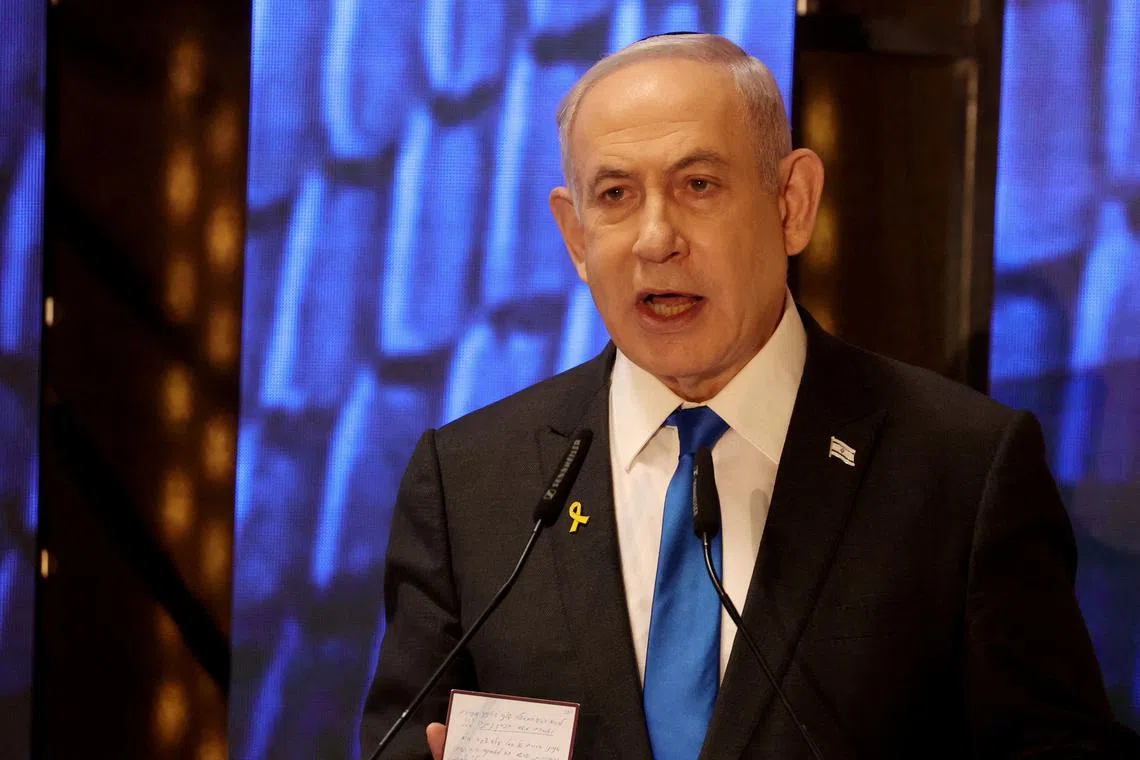No permanent Gaza ceasefire until Hamas destroyed: Netanyahu
Sign up now: Get ST's newsletters delivered to your inbox

Israeli PM Benjamin Netanyahu's statement casts doubt on a key part of a truce proposal that US President Joe Biden said Israel itself had made.
PHOTO: REUTERS
Follow topic:
JERUSALEM – Israeli Prime Minister Benjamin Netanyahu said on June 1 there could be no permanent ceasefire in Gaza until Hamas is destroyed, casting doubt on a key part of a truce proposal that US President Joe Biden said Israel itself had made.
Mr Biden said on May 31 that Israel had proposed a deal
However, Mr Netanyahu’s statement on June 1 said any notion that Israel would agree to a permanent ceasefire before “the destruction of Hamas’ military and governing capabilities” was “a non-starter”.
Peace talks have sputtered for months, with Israel demanding the release of all hostages and the destruction of Hamas, while Hamas demands a permanent ceasefire, the withdrawal of Israeli forces and the release of many Palestinian prisoners.
Hamas said on May 31 it is ready to engage “positively and in a constructive manner” but one of the group’s senior officials, Mr Mahmoud Mardawi, said in a Qatari television interview that it had not yet received the details of the proposal.
“No agreement can be reached before the demand for the withdrawal of the occupation army and a ceasefire is met,” he said. Hamas remains committed to Israel’s destruction.
The war began on Oct 7 when fighters from the Islamist Palestinian group rampaged into southern Israel from Gaza,
Israel’s ground and air campaign in Gaza has left the territory in ruins, led to widespread starvation, and killed more than 36,000 people according to Palestinian health authorities, who say most of the dead are civilians.
Last month, Mr Netanyahu defied calls from world leaders by sending Israeli troops into Rafah,
Israel said Rafah, on the frontier with Egypt, is the last main stronghold for Hamas in Gaza and its campaign to destroy the group could not succeed until it had entered the city.
On May 29, Mr Netanyahu's National Security Adviser Tzachi Hanegbi said he expects the war in Gaza to continue for the rest of 2024 at least.
In the US, Israel’s main ally, the extent of civilian suffering in Gaza has put pressure on Mr Biden to stop the war. The President is hoping to win a second presidential term in the November election.
“It’s time for this war to end and for the day after to begin,” Mr Biden said on May 31, calling on Israel’s leadership to resist pressure from those in the country who wanted the war to go on “indefinitely”.
Inside Israel, anger at the Oct 7 attack has generated widespread support for the war in Gaza, although there is also pressure on the governing coalition to bring back the remaining hostages.
Opposition leader Yair Lapid urged Mr Netanyahu to agree a hostages-and-ceasefire deal, saying his party would support it even if right-wing factions in the governing coalition rebelled, meaning a deal would likely pass in Parliament.
“The government of Israel cannot ignore President Biden’s consequential speech. There is a deal on the table and it should be made,” Mr Lapid said in a social media post on June 1.
Finding language to describe an end to hostilities has proven a major sticking point throughout. Mediators have previously pushed for the two sides to agree to a sustained period of calm as a compromise.
Israel says a permanent ceasefire is not possible against a group that wants to destroy it and that launched the Oct 7 attack.
Hamas says it will not agree any deal that allows Israel's military campaign in Gaza to continue. REUTERS

